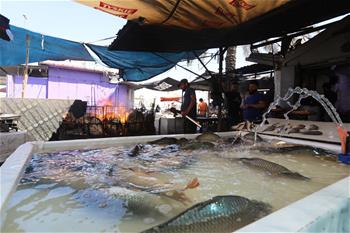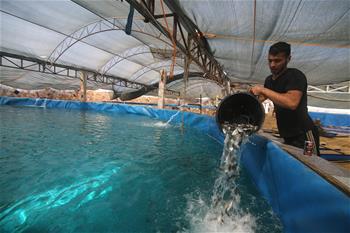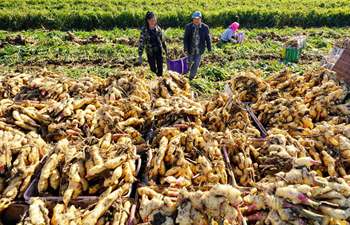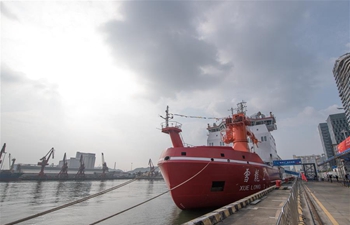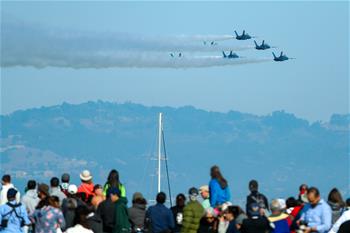ANKARA, Oct. 15 (Xinhua) -- While Turkey's troops are moving deeper into Syria as part of an internationally-criticized incursion, the country's recovering economy may be affected by threats of U.S. and European sanctions.
Turkey's currency, which suffered a crisis a year ago due largely to U.S. sanctions and tariffs, hit its weakest level in nearly five months after U.S. troops left northeastern Syria last week and Ankara ordered attacks against "terrorist elements" there.
The Turkish lira has lost over 4 percent of its value since Operation Peace Spring began on Oct. 9 with the aim of clearing the Turkish border of U.S.-supported Kurdish fighters that Ankara considered as "terrorists" and carving a "safe zone" to relocate millions of Syrian refugees.
The incursion came as the Turkish economy, one of the largest in the Middle East, seemed to be recovering from its first recession in a decade with a steadying inflation and a positive outlook for the end of 2019.
In a series of tweets last week, U.S. President Donald Trump bluntly threatened NATO ally Turkey, saying that he would "obliterate" Turkey's economy if it did anything "off limits" in Syria, without defining what that means.
On Sunday, he tweeted that "the Treasury is ready to go" to impose "powerful sanctions on Turkey," indicating a "great consensus" among lawmakers, and on Monday he insisted that "big sanctions on Turkey coming."
However, Turkish President Recep Tayyip Erdogan seemed to downplay these threats as he was quoted as saying at a closed-door meeting with some media outlets on Sunday.
"Of course things such as economic sanctions are being mentioned. To be honest, I see those as quips along the process," he said, according to Anadolu Agency.
Analysts expressed concerns that the Turkish operation may impact its economic recovery amid a rising hostility in the country against the U.S.-led West who has denounced the unilateral Turkish military action unlike the two previous incursions.
"Let us not forget the state of our economy. Wars are very expensive endeavors," said economist Murat Muratoglu.
He indicated that Saudi Arabia was spending "more than 200 million U.S. dollars a day" for its involvement in the Yemeni conflict and the oil-rich nation had to issue bonds for the first time in its history to fill a growing budget gap.
"Who would want to transfer its money in our country entangled in the possibility of a hot conflict? Moreover, American sanctions can fall any moment upon us," Muratoglu pointed out, insisting that Turkey's economy should not be dragged into "the Syrian quagmire."
The United States reportedly wants to penalize Turkey for attacking a Kurdish faction which has been Washington's closest ally in Syria in the battle against the Islamic State (IS).
Turkey could also face sanctions over its controversial purchase this year of Russian S-400 missile defense system, which defies U.S. hostility.
Meanwhile, several European countries such as Germany, France, the Netherlands, Italy and Finland, have decided to suspend arms sales to Turkey over its ongoing operation.
More punitive measures on a wider scale are expected during a summit of European Union leaders in Brussels this week, a move that would further strain the already deteriorating relations between Ankara and the bloc.
"The news concerning the operation in Syria, arms embargo decision from the EU and probability of sanctions from the United States are creating uncertainty for investors," Oyak Securities, a Turkish military pension fund, said in a note to clients.
Turkey, for its part, insisted that the Syria operation is undeterred by any bans or embargoes from fellow NATO members.
"No matter what anyone does, and no matter if it is an arms embargo or anything like this, it will only make us stronger," Turkish Foreign Minister Mevlut Cavusoglu told German media on weekend.




